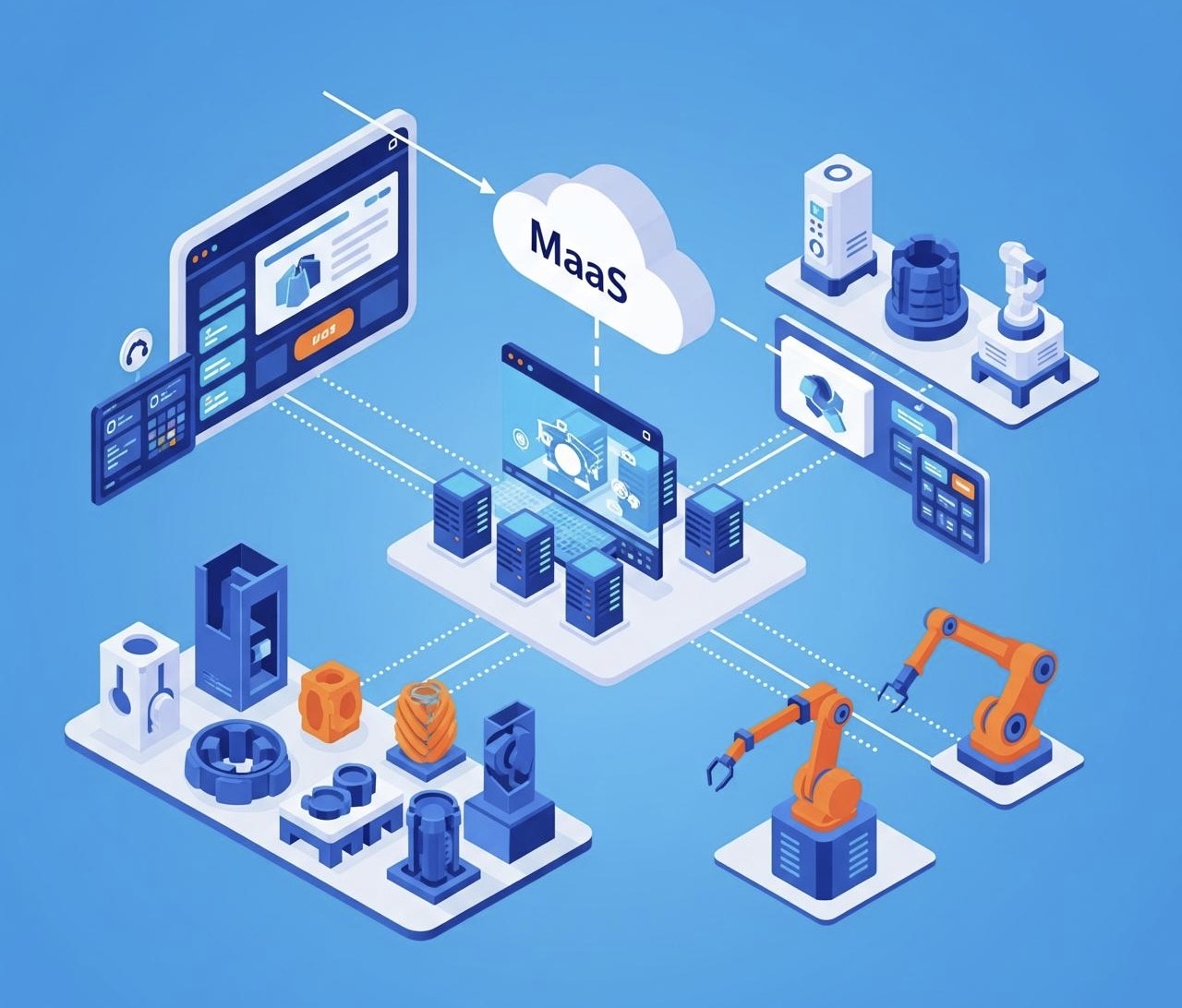
The New Industrial Revolution
Manufacturing as a Service
By: Destiny Dickerson
In an era where speed, customization, and efficiency are paramount, Manufacturing-as-a-Service (MaaS) is revolutionizing the way products are manufactured and delivered. MaaS is not just a buzzword; it represents a new industrial paradigm that enables businesses to tap into global manufacturing capabilities without owning a single machine. Much like cloud computing has revolutionized IT infrastructure, MaaS enables companies to access production tools, advanced manufacturing technologies, and expert knowledge through digital platforms. This shift opens doors for startups, inventors, and even established companies that want to streamline operations and reduce overhead.
The traditional manufacturing model required significant investment, including factories, machinery, trained staff, and ongoing maintenance. This high entry barrier often discouraged innovation, especially among small businesses. However, MaaS flips this model by enabling users to upload a design file and place an order with manufacturers located worldwide. The entire process, from prototyping to final delivery, can happen entirely online, and in some cases, within days. The result is a more flexible, faster, and cost-effective manufacturing experience.
The Digital Manufacturing Marketplace
Central to MaaS is the idea of a digital manufacturing marketplace. These platforms serve as intermediaries that connect clients with verified manufacturing partners. Users upload 3D models or CAD files, select preferred materials, and receive instant quotes for production. From there, the system matches the order with a partner based on capabilities, availability, and cost. The client doesn’t need to worry about machine types, supplier vetting, or logistics; everything is streamlined through a single point of access.
A great example of this model is Xometry, a U.S.-based company that operates one of the world’s largest on-demand manufacturing networks. Startups in industries such as robotics, aerospace, and medical technology utilize Xometry to produce a wide range of products, from custom gears to specialized brackets. A user can upload a design and receive an AI-generated quote within seconds. The platform then routes the job to a vetted partner with the right tools and materials to handle the request. Protolabs, another leader in this space, also stands out by offering design feedback to improve manufacturability before the production process even begins. These services are crucial for early-stage companies that may not have in-house engineers or manufacturing expertise.
Real-World Impact
For many small businesses and solo innovators, MaaS is a game-changer. Imagine a mechanical engineer developing a prototype for a new type of bicycle gear. Instead of investing in costly equipment or waiting months for a local machine shop to complete the job, the engineer can utilize MaaS to have the part manufactured and delivered in under a week. This drastically reduces time-to-market, allowing for more time for iteration and improvement. It also makes experimentation more affordable, supporting a culture of innovation and agility.
Larger companies are benefiting too. In the automotive sector, MaaS platforms are helping manufacturers meet fluctuating demand without overproducing or overcommitting factory resources. This is particularly useful in today’s volatile supply chain environment. When parts are needed urgently, companies can source from multiple partners in different regions, thereby reducing their dependency on a single supplier and minimizing disruptions caused by geopolitical tensions or logistics issues.
Customization and Sustainability
Another significant benefit of MaaS is the ability to offer customized products at scale. Traditional factories are optimized for mass production, where producing thousands of identical items is more cost-effective than small batches. But in the MaaS model, mass customization becomes feasible. Companies can produce limited runs or even one-off products without incurring significant setup costs. This is ideal for industries such as healthcare, where patient-specific devices or implants are becoming increasingly common.
From a sustainability standpoint, MaaS also has advantages. By decentralizing production and enabling localized manufacturing, it can reduce the carbon footprint associated with long-distance shipping. Since MaaS providers often use digital simulations and precise machining methods, material waste is also minimized. Furthermore, many platforms now partner with facilities that run on renewable energy or practice closed-loop manufacturing systems.
Challenges Ahead
Despite its many benefits, MaaS is not without challenges. Intellectual property protection remains a concern, especially when sending proprietary designs to third-party vendors. Cybersecurity and data integrity must be top priorities for MaaS platforms, particularly when handling sensitive industrial data. There’s also the challenge of quality control. While digital feedback and supplier ratings help, not all manufacturers deliver consistent results. As the MaaS ecosystem matures, platforms are investing more in automated quality checks, supplier audits, and traceability features to build trust.
There’s also a cultural shift involved. Many companies are used to having tight control over their production. Transitioning to a model where core manufacturing is outsourced through a platform requires a change in mindset, one that fosters transparency, effective communication, and a shared ownership of outcomes.
The Road Ahead
The future of MaaS is promising, particularly as technologies such as AI, IoT, and blockchain continue to mature and evolve. Artificial intelligence will play a bigger role in quoting, predictive maintenance, and supply chain optimization. IoT sensors will enable real-time tracking of parts through production and delivery. Blockchain can improve traceability and enhance trust between clients and providers. As MaaS platforms integrate these technologies, they’ll offer even more intelligent and resilient services.
MaaS is not just an operational convenience; it’s a strategic asset. It enables businesses to remain lean, move quickly, and respond to customer needs with greater agility. Whether it’s launching a new product, managing seasonal demand, or expanding into new markets, MaaS provides the flexibility modern businesses need to thrive in a rapidly changing world.
Sources:
- Zuehlke Group. “Top Emerging Manufacturing Industry Trends for 2025.” Retrieved from https://www.zuehlke.com
- CPL Group. “Top Manufacturing Trends to Watch in 2025.” Retrieved from https://cplgroup.com
- Bizcommunity. “5 Key Trends Driving the Manufacturing Sector in 2025.” Retrieved from https://www.bizcommunity.com
- Xometry Official Website. Retrieved from https://www.xometry.com
- Protolabs Official Website. Retrieved from https://www.protolabs.com